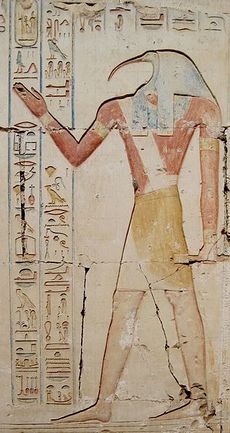Thoth

Thoth was an Egyptian God, also called Tehuti; the god of wisdom, learning and literature; the inventor of all arts and sciences, including writing, arithmetic, algebra, geometry, theology, political economy, medicine, surgery, music and musical instruments. He is usually depicted as counselor and friend of the Egyptian rulers Osiris and Horus, the scribe of the kingdom and amanuensis of the gods.
Succeeding Horus to the throne, Thoth is said to have reigned for over three thousand years as a model ruler, then to have taken his place among the gods as guardian of the moon, patron of history, herald, scribe, and keeper of the divine archives. In addition, he is the recorder of the judgment who weighs the hearts of the deceased and reports the verdict before Osiris. Thoth is often portrayed as an ibis (a bird related to a heron with a long downwardly curved bill) or an ibis-headed man; the exact significance of this symbology has never been discovered.
Archaeologist James Churchward traces Thoth back to the days of Atlantis using information he claims to have deciphered from ancient tablets discovered in India and Mexico, confirmed by more than fifty years of his own research:
The first we hear about the religion of Egypt is where an ancient record states that about 16,000 years ago Thoth, the son of an Atlantean Priest, planted the Egyptian colony at the mouth of the Nile, and at Sais on the banks of the Nile built a temple and taught the Osirian religion.... Egypt was a sub-colony of the Motherland [Lemuria] under direct control of the colonial empire—Atlantis.”[1]
The Greeks identified Thoth with their god Hermes (the messenger of the gods, whom the Romans associated with Mercury) and with Hermes Trismegistus (meaning “the thrice greatest Hermes”), author of sacred writings and alchemical and astrological works. On the famous Rosetta stone, inscribed by priests of Ptolemy V (d. 180 B.C.), Hermes is called “the great-great,” or “twice great.”
Hargrave Jennings wrote in his introduction to one of the extant works of Hermes, The Divine Pymander:
Hermes was called by the Egyptians TAT, TAUT, THOTH. It is concluded that, because of his learning and address, and in wonder at his profound skill in the arts and sciences, that the people gave him the name of TRISMEGISTUS, or the ‘THRICE GREAT.’... Some have been so fanciful as to make him one with ADAM,” as well as Enoch, Canaan, and the patriarch Joseph.
Perhaps—in spite of all the foregoing exaggerations, which are always the lot of very great and highly distinguished men, who became deified in after-times—the most probable judgment to be formed concerning him is, that he was some person of superior genius, who, before the time of Moses, had invented useful arts, and taught the first rudiments of science; and who caused his instructions to be engraved in emblematical figures (hieroglyphics), upon tables or columns of stone (obelisks), which he dispersed over the country, for the purpose of enlightening the people, and of fixing the worship of the gods....
Another Thoth, or Hermes, is said to have lived at a later period. He was equally celebrated with the former, and to him is particularly appropriated, by some, the name of Trismegistus. According to Manetho [an Egyptian priest and historian c. 300 B.C.], he [this second Thoth] translated from engraved tables of stone, which had been buried in the earth, the sacred characters of the first Hermes, and wrote the explanation of them in books, which were deposited in the Egyptian temples. The same author calls him the son of Agathodaemon; and adds that to him are ascribed the restoration of the wisdom taught by the first Hermes, and the revival of geometry, arithmetic and the arts among the Egyptians, after they had been long lost or neglected....
He is said to have written a very large number of books, as commentaries upon the tables of the first Hermes, which treated of universal principles, of the nature of the universe, and of the soul of man; of the governing of the world by the movements of the stars (otherwise in astrology); of the Divine Light, and of its shadow ...[2]
Manetho said Hermes wrote 36,525 books and the Neoplatonic philosopher Iamblichus (d. c. 330) sets the number at 20,000. Clement of Alexandria, Greek theologian and a father of the Church (d. c. 215), names 42 “Books of Thoth” dealing with priestly education, temple ritual, geography, astrology, guidance for kings, hymns to the gods, and medicine. These were lost in the burning of Alexandria. Writing of the mystical significance of Thoth, one author states, “In the mystic sense Thoth or the Egyptian Hermes was the symbol of the Divine Mind; he was the incarnated Thought, the living Word—the primitive type of the Logos of Plato and the Word of the Christians.”
See also
Sources
Mark L. Prophet and Elizabeth Clare Prophet, Lost Teachings of Jesus 2: Mysteries of the Higher Self, pp. 281–83.
